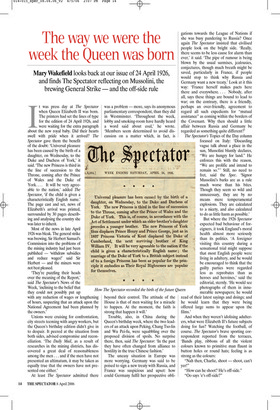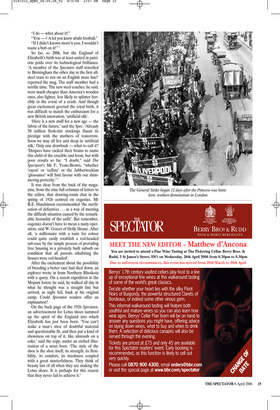The way we were the week the Queen was born
Mary Wakefield looks back at our issue of 24 April 1926, and finds The Spectator reflecting on Mussolini, the brewing General Strike — and the off-side rule It was press day at The Spectator when Queen Elizabeth II was born. The printers had set the lines of type for the edition of 24 April 1926, and were waiting for the extra paragraph about the new royal baby. Did their hearts swell with pride when it arrived? The Spectator gave them the benefit of the doubt: ‘Universal pleasure has been caused by the birth of a daughter, on Wednesday, to the Duke and Duchess of York,’ it said. ‘The new Princess is third in the line of succession to the Throne, coming after the Prince of Wales and the Duke of York.... It will be very agreeable to the nation,’ added The Spectator, ‘if the child is given a characteristically English name.’ The page cast and set, news of Elizabeth’s arrival was printed, surrounded by 30 pages describing and analysing the country she was later to inherit.
Most of the news in late April 1926 was bleak. The general strike was brewing, Sir Herbert Samuel’s Commission into the problems of the mining industry had just been published — ‘withdraw subsidies and reduce wages!’ said Sir Herbert — and the miners were not best pleased.
‘They’re puzzling their heads over the meaning of the Report,’ said The Spectator’s News of the Week, ‘inclining to the belief that they could not possibly put up with any reduction of wages or lengthening of hours, suspecting that an attack upon the National Agreement had been planned by the owners.’ Unions were cruising for confrontation, city streets teeming with angry workers, but the Queen’s birthday edition didn’t give in to despair. It peered at the situation from both sides, advised compromise and reconciliation. ‘The Daily Mail, as a result of researches in the mining districts, has discovered a great deal of reasonableness among the men ... and if the men have not presented an ultimatum, it may be taken as equally true that the owners have not presented one either.’ At least The Spectator admitted there was a problem — more, says its anonymous parliamentary correspondent, than they did in Westminster. ‘Throughout the week, lobby and smoking-room have hardly heard a word said about coal,’ he wrote. ‘Members seem determined to avoid discussion on a matter which, in fact, is beyond their control. The attitude of the House is that of men waiting for a miracle to happen. At the moment, the faith is strong that happen it will.’ Trouble, also, in China during the Queen’s birthday week, where the two leaders of an attack upon Peking, Chang Tso-lin and Wu Pei-fu, were squabbling over the proposed division of spoils. No surprise there, then, said The Spectator: ‘In the past they have often changed from alliance to hostility in the true Chinese fashion.’ The uneasy situation in Europe was more worrying. Germany was said to be poised to sign a new treaty with Russia, and France was suspicious and upset: how could Germany fulfil her prospective obli gations towards the League of Nations if she was busy pandering to Russia? Once again The Spectator insisted that civilised people look on the bright side. ‘Really, there seems to be less cause for alarm than ever,’ it said. ‘The pipe of rumour is being blown by the usual surmises, jealousies, conjectures, though much breath might be saved, particularly in France, if people would stop to think why Russia and Germany want a new treaty.’ Look at it this way: ‘France herself makes pacts here there and everywhere.... Nobody, after all, says these things are bound to lead to war; on the contrary, there is a friendly, perhaps an over-friendly, agreement to regard all such expedients for “mutual assistance” as coming within the borders of the Covenant. Why then should a little affair between Russia and Germany be regarded as something quite different?’ The Spectator’s Topics of the Day column focused on Italy: ‘Discarding vague talk about a place in the sun, Mussolini bluntly declares, “We are hungry for land.” He enforces this with the reason, “We are prolific and intend to remain so.”’ Still, no need to fret, said the Spec. ‘Signor Mussolini’s barks are as a rule much worse than his bites. Though they seem so wild and unnecessary, they are by no means mere temperamental explosions. They are calculated to a nicety, and also calculated to do as little harm as possible.’ But where the 1926 Spectator expected bad behaviour of foreigners, it took England’s moral health almost more seriously than its politics. ‘A foreigner visiting this country during a sensational trial might suppose that most English people were living in adultery, and he would be encouraged to think that the guilty parties were regarded less as reprobates than as heroes and heroines,’ said the editorial, sternly. ‘He would see photographs of them in innumerable newspapers; he would read of their latest sayings and doings; and he would learn that they were being offered large sums to appear upon the films.’ And when they weren’t idolising adulterers, what were Elizabeth II’s future subjects doing for fun? Watching the football, of course. The Spectator’s brave sporting correspondent reported from the terraces, ‘Bands play, ribbons of all the violent colours known to primitive man flaunt in button holes or round hats; feeling is as strong as the colours: “Nah then, Charlie, shoot — shoot, can’t yer!” “How can he shoot? He’s off-side.” “Oo says ’e’s off-side?” “I do — what about it!” “You —–! A lot you know abaht football.” “If I didn’t known more’n you, I wouldn’t waste a bob on it!” ’ So far, so 2006, but the England of Elizabeth’s birth was at least united in patriotic pride over its technological brilliance. ‘A member of the Spectator staff travelled to Birmingham the other day in the first allsteel train to run on an English main line!’ reported the mag. The staff member had a terrific time. The new steel coaches, he said, were much cheaper than America’s wooden ones, also lighter, less likely to splinter horribly in the event of a crash. And though great excitement greeted the royal birth, it was difficult to match the enthusiasm for a new British innovation, ‘artificial silk’.
‘Here is a new stuff for a new age — the fabric of the future,’ said the Spec. ‘Already 50 million flesh-tint stockings flaunt its prestige with the mothers of tomorrow. Soon we may all live and sleep in ‘artificial silk.’ Only one drawback — what to call it? ‘Drapers have racked their brains to name this child of the crucible and loom, but with poor results so far. “I doubt,” said The Spectator’s Mr F. Yeats-Brown, “whether ‘rayon’ or ‘celline’ or the Jabberwockian ‘glossamer’ will find favour with our shimmering posterity.”’ It was clear from the back of the magazine, from the nine full columns of letters to the editor, that drawing-room chat in the spring of 1926 centred on eugenics. Mr R.E. Hutchinson recommended ‘the sterilisation of defectives ... as a way of meeting the difficult situation caused by the remarkable fecundity of the unfit’. But remember, eugenics doesn’t have to mean a nasty operation, said W. Gosset of Holly House. After all, ‘a millionaire with a taste for colour could quite easily establish a red-headed sub-race by the simple process of providing free housing in a privately built suburb on condition that all parents inhabiting the houses were red-headed’.
After the excitement about the possibility of breeding a better race had died down, an explorer wrote in from Northern Rhodesia with a query. On a recent expedition in the Mopani forest, he said, he walked all day in what he thought was a straight line but arrived, as night fell, back at his original camp. Could Spectator readers offer an explanation?
On the back page of the 1926 Spectator, an advertisement for Lotus shoes summed up the spirit of the England into which Elizabeth has just been born. ‘You can’t make a man’s shoe of doubtful material and questionable fit, and then put a kind of showiness on top of it, like almonds on a cake,’ said the copy, under an etched illustration of a stout boot. ‘The style of the shoe is the shoe itself, its strength, its flexibility, its comfort, its meekness coupled with a great masterfulness. They think of beauty last of all when they are making the Lotus shoes. It is perhaps for this reason that they never fail to achieve it.’











































































 Previous page
Previous page